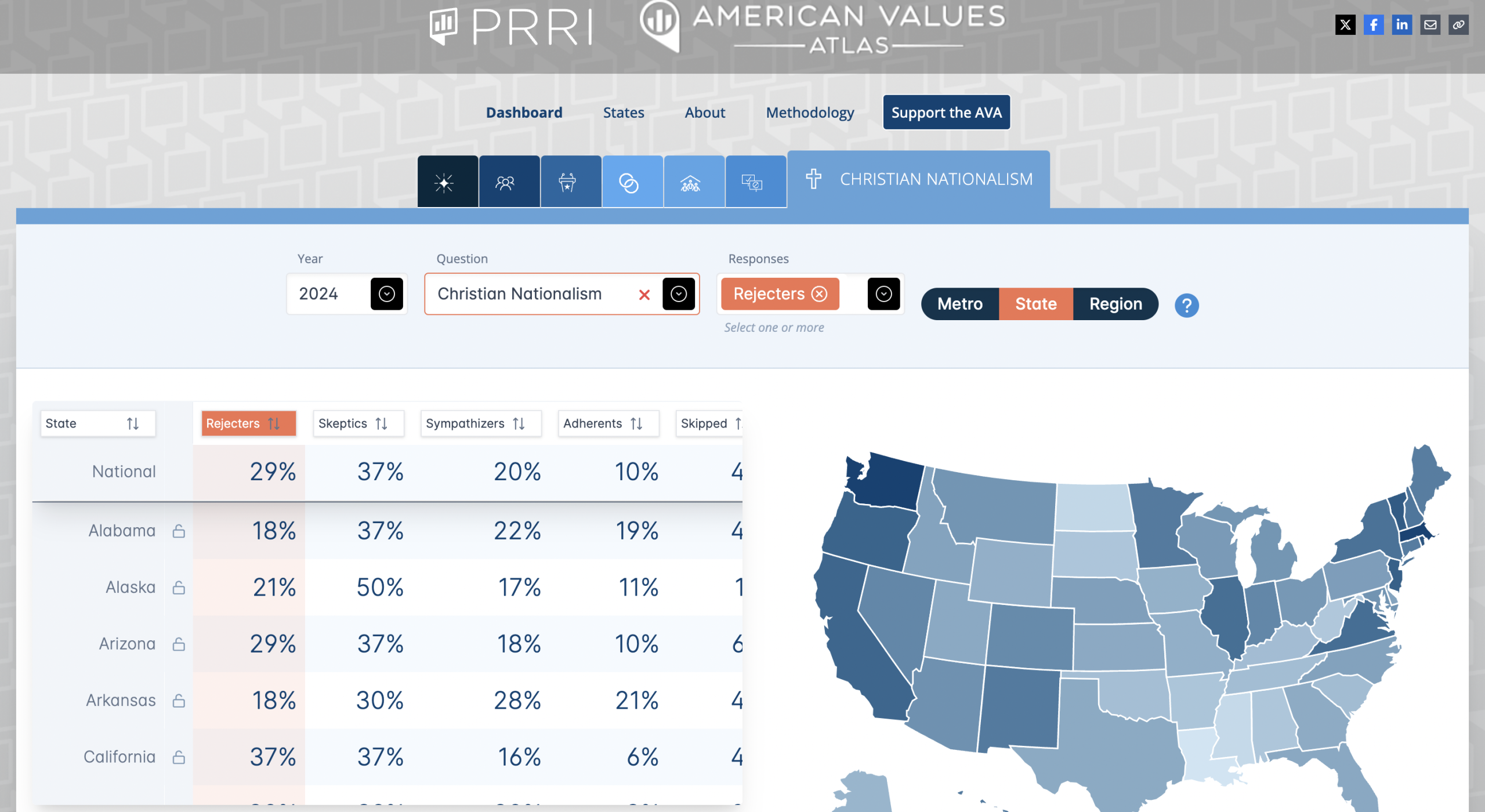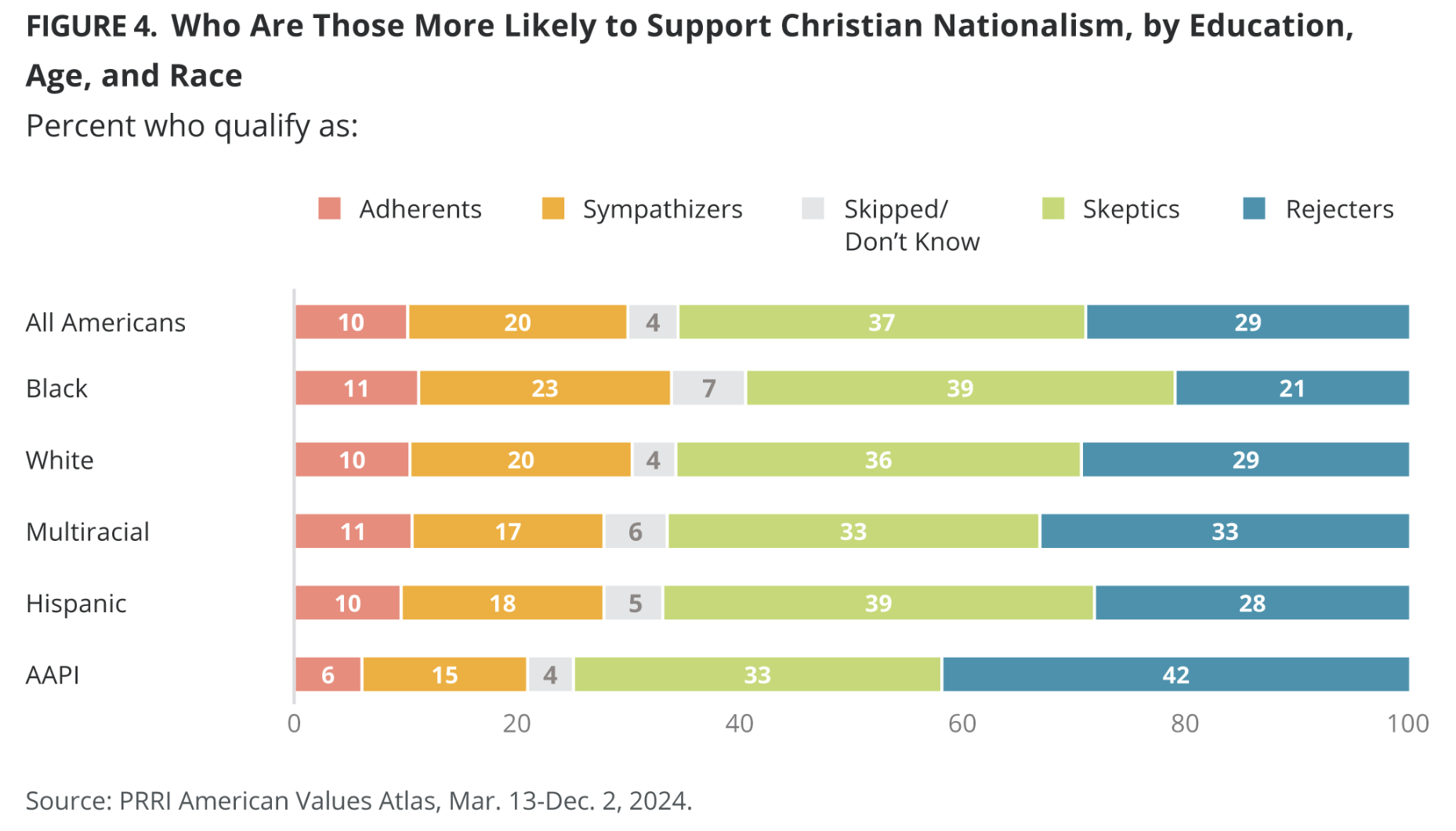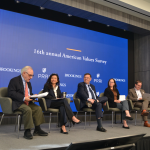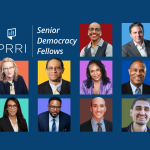In early July, PRRI hosted a timely panel discussion about the role of patriotism and Christian nationalism.
Affiliated scholars Eric L. McDaniel, Ph.D., and Samuel L. Perry, Ph.D., joined PRRI public fellow Allyson Shortle, Ph.D., and CEO Melissa Deckman, Ph.D. to make sense of Christian Nationalism and its relationship with patriotism.
After sharing the state-level, Christian nationalism data available to explore on the interactive PRRI American Values Atlas, Deckman asked the panelists to begin by describing Christian nationalism.
Shortle explained, “At its most basic form, [Christian nationalism is] believing that in order to be a true American, one should be Christian. It’s an infusion of the idea of Christianity within American identity.”
McDaniel acknowledged that there is both an elite and individual aspect to Christian nationalism.
“We can think of Christian nationalism at the elite level as a part of nation-building and state legitimization. At the individual level, we can think of Christian nationalism as an identity — a way for people to establish who they are, where they fall in the world, and who their friends and enemies are.”
Perry highlighted that using Christian nationalist rhetoric can be a political strategy, noting that some politicians use the word “Christian” to mean “people like us.”
“When savvy politicians use that kind of language, it can signal to Christians that ‘the nation belongs to us,’ which can imply an ethnic history and values that ‘good people like us’ have.”
PRRI finds that 30% of Americans agree that being Christian is an important part of being truly American. Perry noted that this raises the question of whether people should support their country unconditionally.
“The more Americans think that being Christian is important to being truly American, the far more likely they are to agree that people should support their country even when it’s in the wrong.”
Shortle broke down the difference between patriotism and nationalism.
“Patriotism can be in-group love, pride in democracy, and pride in the scientific achievements of your country. Nationalism is the negative variant. It’s a belief in the superiority of your country over all others.”
Shortle argues that nationalism can manifest into blind patriotism, or supporting one’s country even when it does harm. This contrasts with constructive patriotism, or the idea that in order to be a patriot, you must question your country.
McDaniel discussed how race moderates understandings of Christian nationalism and patriotism, depending on racial groups’ relationship with the nation.
“If the group sees the nation as something that has been beneficial to them, they are more likely to have blind patriotism. Whereas those who see the nation as having a history of being antagonistic to their interest, they’re going to uphold this idea of constructive patriotism.”
PRRI finds that 34% and 28% of Black and Hispanic Americans, respectively, qualify as either Christian nationalism adherents or sympathizers, compared with 30% of white Americans.
Shortle also shared initial findings from the research she recently conducted with other PRRI public fellows on the effect of Christian nationalism on local-level politics.
Finally, the panelists discussed using patriotism as a tool to mobilize a pluralistic resistance to Christian nationalism.
“ I think people have become increasingly isolated and are not building the social capital that’s needed. If we change our understanding of what it means to be a patriot and interact more with other Americans, it would decrease the sense of threat.” McDaniel added.
Noting that he draws a strong line between patriotism and Christian nationalism, Perry called for a return to common values, like liberty and democracy, concluding, “I think it’s about transcending these national, partisan divisions to understand how we are connected with each other.”
View the full event recording here. Explore the PRRI American Values Atlas site here.
Find all PRRI research and commentary on Christian nationalism here.









